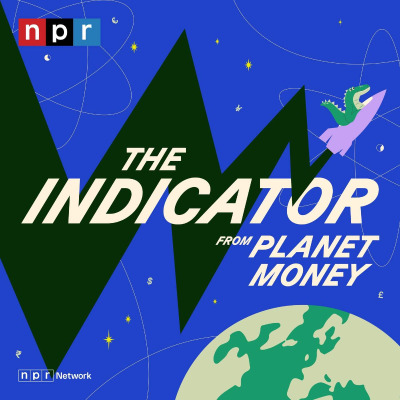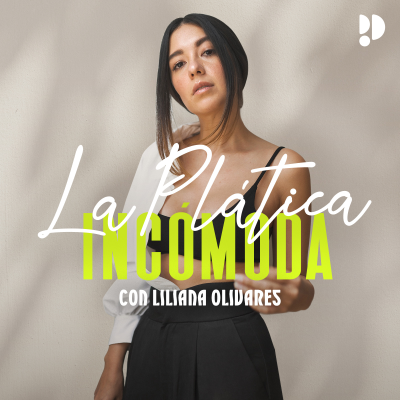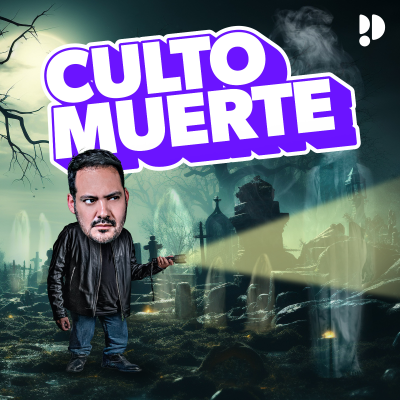
The Indicator from Planet Money
inglés
Negocios
Empieza 7 días de prueba
$99 / mes después de la prueba.Cancela cuando quieras.
- 20 horas de audiolibros al mes
- Podcasts solo en Podimo
- Podcast gratuitos
Acerca de The Indicator from Planet Money
A bite-sized show about big ideas. From the people who make Planet Money, The Indicator helps you make sense of what's happening in today's economy. It's a quick hit of insight into money, work, and business. Monday through Friday, in 10 minutes or less.
Todos los episodios
1914 episodiosWant a 2.5% mortgage? Buy it.
Remember those juicy mortgage rates from back in 2021? You don’t actually need a time machine to get one today. You just need to find someone willing to sell their house AND their mortgage to you. Called ‘assumable mortgages,’ they take a long time to get,, and you’ll probably need a fat wad of cash. On today’s show, how to buy your way into a cheap mortgage rate. Related episodes: How mortgage rates get made [https://www.npr.org/2022/03/16/1087086300/how-mortgage-rates-get-made] How mortgage interest rates work (and why they're currently out of whack) [https://www.npr.org/2024/08/28/1197972299/mortgage-interest-rates-treasury-bond] For sponsor-free episodes of The Indicator from Planet Money, subscribe to Planet Money+ via Apple Podcasts or at plus.npr.org [http://plus.npr.org/]. Fact-checking by Tyler Jones. Music by Drop Electric [https://dropelectric.bandcamp.com/]. Find us: TikTok [https://www.tiktok.com/@planetmoney], Instagram [https://www.instagram.com/planetmoney/], Facebook [https://www.facebook.com/planetmoney], Newsletter [https://www.npr.org/newsletter/money]. To manage podcast ad preferences, review the links below: See pcm.adswizz.com [https://pcm.adswizz.com] for information about our collection and use of personal data for sponsorship and to manage your podcast sponsorship preferences. Learn more about sponsor message choices: podcastchoices.com/adchoices [https://podcastchoices.com/adchoices] NPR Privacy Policy [https://www.npr.org/about-npr/179878450/privacy-policy]
The anxiety rattling China’s youth
China will soon unveil its economic blueprint for the next five years, including a target for economic growth. This comes as consumption is down, wages aren’t rising, and property prices continue to drop. So what’s the plan? Today, we hear from NPR’s China correspondent Jennifer Pak about the challenges facing China’s economic policymakers. FYI, we are going on a book tour! Planet Money’s first ever book comes out in April. We’ll be celebrating in about a dozen cities. There’s a limited edition tote bag included with your ticket, while supplies last. Details, dates and how to get your ticket at planetmoneybook.com [http://planetmoneybook.com]. Related episodes: What might save China’s economy [https://www.npr.org/2025/03/18/1239156785/what-might-save-chinas-economy] China’s luxury liquor indicator [https://www.npr.org/2024/07/15/1197967654/china-economy-baijiu-kissinger] For sponsor-free episodes of The Indicator from Planet Money, subscribe to Planet Money+ via Apple Podcasts or at plus.npr.org [http://plus.npr.org/]. Fact-checking by Sierra Juarez [https://www.npr.org/people/1268825622/sierra-juarez]. Music by Drop Electric [https://dropelectric.bandcamp.com/]. Find us: TikTok [https://www.tiktok.com/@planetmoney], Instagram [https://www.instagram.com/planetmoney/], Facebook [https://www.facebook.com/planetmoney], Newsletter [https://www.npr.org/newsletter/money]. To manage podcast ad preferences, review the links below: See pcm.adswizz.com [https://pcm.adswizz.com] for information about our collection and use of personal data for sponsorship and to manage your podcast sponsorship preferences. Learn more about sponsor message choices: podcastchoices.com/adchoices [https://podcastchoices.com/adchoices] NPR Privacy Policy [https://www.npr.org/about-npr/179878450/privacy-policy]
Why Paramount went looney tunes for Warner Bros.
Paramount Skydance is making a $110 billion play for Warner Bros. Discovery, and with it intellectual property like Harry Potter, Batman, and subsidiaries HBO and CNN. On today’s show, who is the man behind the deal? Does he really want to make movies? Will any regulators try to stop it? FYI, we are going on a book tour! Planet Money’s first ever book comes out in April. We’ll be celebrating in about a dozen cities. There’s a limited edition tote bag included with your ticket, while supplies last. Details, dates and how to get your ticket at planetmoneybook.com [http://planetmoneybook.com]. Related: The Warner Bros. curse (newsletter) [https://www.npr.org/sections/planet-money/2025/12/16/g-s1-102314/the-warner-bros-curse] Coyote vs. Warner Bros. [https://www.npr.org/2023/12/19/1197959098/coyote-vs-acme-warner-bros-discovery-will-forte-john-cena-amazon-paramount] For sponsor-free episodes of The Indicator from Planet Money, subscribe to Planet Money+ via Apple Podcasts or at plus.npr.org [http://plus.npr.org/]. Fact-checking by Sierra Juarez [https://www.npr.org/people/1268825622/sierra-juarez]. Music by Drop Electric [https://dropelectric.bandcamp.com/]. Find us: TikTok [https://www.tiktok.com/@planetmoney], Instagram [https://www.instagram.com/planetmoney/], Facebook [https://www.facebook.com/planetmoney], Newsletter [https://www.npr.org/newsletter/money]. To manage podcast ad preferences, review the links below: See pcm.adswizz.com [https://pcm.adswizz.com] for information about our collection and use of personal data for sponsorship and to manage your podcast sponsorship preferences. Learn more about sponsor message choices: podcastchoices.com/adchoices [https://podcastchoices.com/adchoices] NPR Privacy Policy [https://www.npr.org/about-npr/179878450/privacy-policy]
Should the families of organ donors be compensated?
Two economists get into the business—and stakes—of organ donation, and they argue why the government should financially compensate their families. FYI, we are going on a book tour! Planet Money’s first ever book comes out in April. We’ll be celebrating in about a dozen cities. There’s a limited edition tote bag included with your ticket, while supplies last. Details, dates and how to get your ticket at planetmoneybook.com [http://planetmoneybook.com]. Related episodes: Too many subscriptions, not enough organs [https://www.npr.org/2023/03/24/1165947234/too-many-subscriptions-not-enough-organs] Your Organs, Please [https://www.npr.org/sections/money/2015/10/28/452655987/episode-518-your-organs-please] For sponsor-free episodes of The Indicator from Planet Money, subscribe to Planet Money+ via Apple Podcasts or at plus.npr.org [http://plus.npr.org/]. Fact-checking by Sierra Juarez [https://www.npr.org/people/1268825622/sierra-juarez]. Music by Drop Electric [https://dropelectric.bandcamp.com/]. Find us: TikTok [https://www.tiktok.com/@planetmoney], Instagram [https://www.instagram.com/planetmoney/], Facebook [https://www.facebook.com/planetmoney], Newsletter [https://www.npr.org/newsletter/money]. To manage podcast ad preferences, review the links below: See pcm.adswizz.com [https://pcm.adswizz.com] for information about our collection and use of personal data for sponsorship and to manage your podcast sponsorship preferences. Learn more about sponsor message choices: podcastchoices.com/adchoices [https://podcastchoices.com/adchoices] NPR Privacy Policy [https://www.npr.org/about-npr/179878450/privacy-policy]
ICE is bad for business, heat is bad for coffee, and sci-fi is bad for markets
It’s … Indicators of the Week (now on YouTube!), our weekly look at some of the most fascinating economic numbers from the news. On today’s episode: How Minnesota workers were affected by Operation Metro Surge, why coffee’s getting more expensive, and what happens when a sci-fi AI scenario meets the stock market [https://www.citriniresearch.com/p/2028gic]. Related episodes: How ICE crackdowns are affecting the workforce [https://www.npr.org/2025/07/03/1255164459/ice-crackdown-jobs-friday-report] Why this rural town wants an ICE facility [https://www.npr.org/2026/02/19/nx-s1-5718368/why-this-rural-town-wants-an-ice-facility] For sponsor-free episodes of The Indicator from Planet Money, subscribe to Planet Money+ via Apple Podcasts or at plus.npr.org [http://plus.npr.org/]. Fact-checking by Julia Ritchey and Vito Emanuel. Music by Drop Electric [https://dropelectric.bandcamp.com/]. Find us: TikTok [https://www.tiktok.com/@planetmoney], Instagram [https://www.instagram.com/planetmoney/], Facebook [https://www.facebook.com/planetmoney], Newsletter [https://www.npr.org/newsletter/money]. To manage podcast ad preferences, review the links below: See pcm.adswizz.com [https://pcm.adswizz.com] for information about our collection and use of personal data for sponsorship and to manage your podcast sponsorship preferences. Learn more about sponsor message choices: podcastchoices.com/adchoices [https://podcastchoices.com/adchoices] NPR Privacy Policy [https://www.npr.org/about-npr/179878450/privacy-policy]
Elige tu suscripción
Premium
20 horas de audiolibros
Podcasts solo en Podimo
Podcast gratuitos
Cancela cuando quieras
Empieza 7 días de prueba
Después $99 / mes
Empieza 7 días de prueba. $99 / mes después de la prueba. Cancela cuando quieras.





































